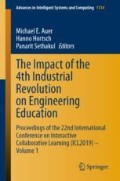Abstract
This article presents a development of an instructional model based on work-integrated learning for a new generation of graduates: a case study of Fujikura Electronics (Thailand) Ltd. With teaching and learning of Faculty of Engineer, Rajamangala University of Technology Lanna. The results found that teaching and learning management model developed from the principles of constructionism and work-based learning in the form of SLLCLE Model satisfied quality assessments by experts with a high level of satisfaction. The application to the sample group of 20 students presents a result that the E1/E2 criteria were found at the level of 85.8/83.2, which was higher than the requirements set at the level of 80/80; the satisfaction of the sample group at a high level. Therefore, the development of SLLCLE teaching and learning management model can be effectively applied to the teaching and learning of work-integrated learning.
Access this chapter
Tax calculation will be finalised at checkout
Purchases are for personal use only
References
Saman, A.: Thai education 4.0: new concept and trends of Thai education provision. J. Ratchathani Innov. Soc. Sci. 1(1), 1–11 (2017)
Paitoon, P., et al.: The educational development in the 21st century under the Thailand 4.0 framework. J. Ind. Educ. 16(2), 199–206 (2017)
Suvit, M.: Strategy and Reform to Thailand 4.0. Ministry of Education, Bangkok (2016)
Kanyawit, K., Warinee, W., Pichit, U., Somsak, A.: Development of REPEA learning model based on STEM-T education. In: The International STEM Education Conference, pp. 123–126 (2016)
Nipont, T., Somsak, A.: Engineering instructional management using MISOP integrated learning model. In: The International STEM Education Conference, pp. 4–7 (2016)
Joungtrakul, J., Kietpiriyawong, D.: Competency based skills development: a case study of a dock station management company in Thailand. HRD J. 2(1), 113–124 (2011)
Thanin, S.: Research and Statistical Analysis with SPSS and AMOS, 13th edn. SR Printing Mass Product Co. Ltd., Bangkok (2012)
Author information
Authors and Affiliations
Corresponding author
Editor information
Editors and Affiliations
Rights and permissions
Copyright information
© 2020 Springer Nature Switzerland AG
About this paper
Cite this paper
Chaithanu, K., Nuangpirom, P., Ruangsiri, K. (2020). A Development of Instructional Model Based on Work-Integrated Learning for New Generation of Graduates: Case Study of Fujikura Electronics (Thailand) Ltd.. In: Auer, M., Hortsch, H., Sethakul, P. (eds) The Impact of the 4th Industrial Revolution on Engineering Education. ICL 2019. Advances in Intelligent Systems and Computing, vol 1134. Springer, Cham. https://doi.org/10.1007/978-3-030-40274-7_45
Download citation
DOI: https://doi.org/10.1007/978-3-030-40274-7_45
Published:
Publisher Name: Springer, Cham
Print ISBN: 978-3-030-40273-0
Online ISBN: 978-3-030-40274-7
eBook Packages: Intelligent Technologies and RoboticsIntelligent Technologies and Robotics (R0)

